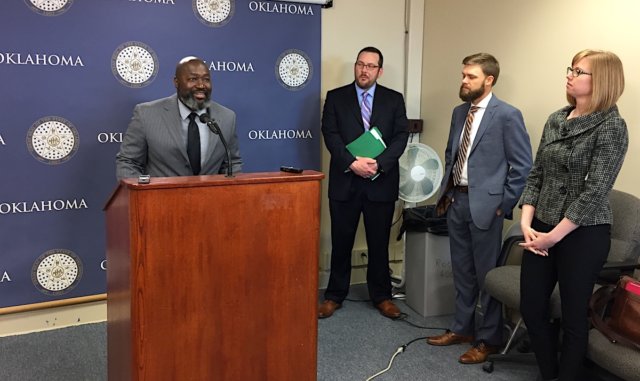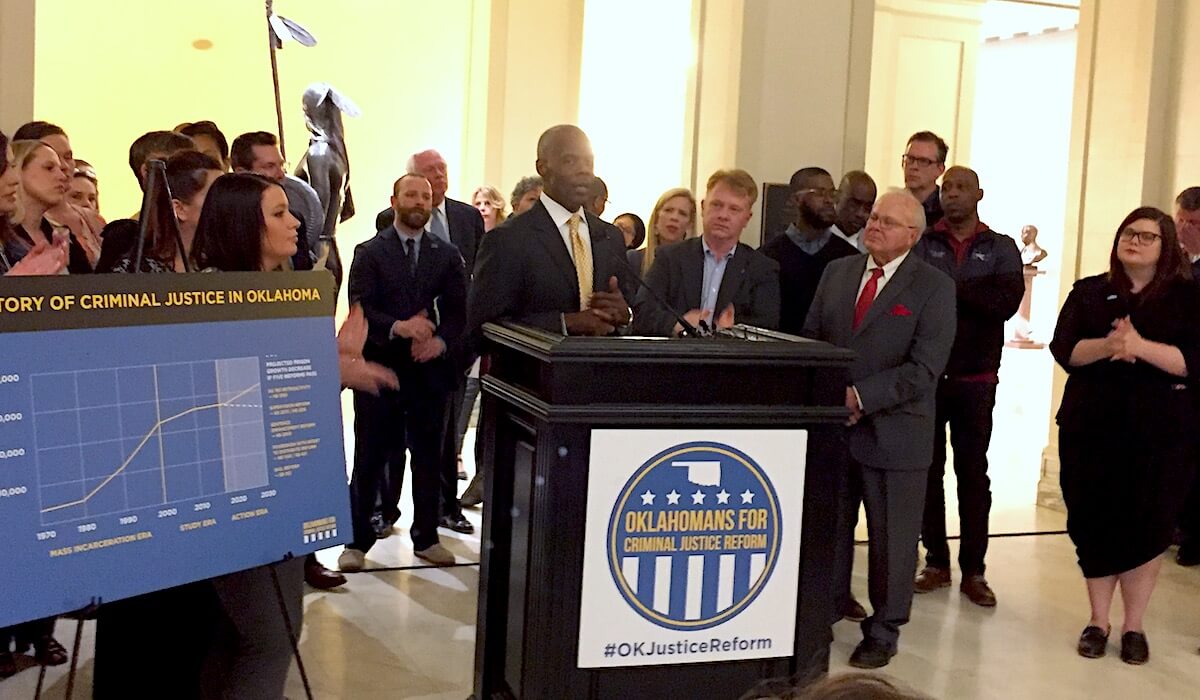

Gov. Kevin Stitt publicly waded into one of the Oklahoma Legislature’s most complicated policy negotiations this week, announcing an outline of criminal justice reform efforts he said can be passed this session.
“I felt it kind of stalling out, so I circled the troops and we’ve got five bills that I’m trying to push through,” Stitt said Wednesday afternoon as he entered the State Capitol.
Stitt’s announcement about two hours earlier had requested “a new funding structure for district attorneys and courts that sends fines and fees to the general revenue fund to then be appropriated.” He also called for “more than $10 million” to fund mental health and jail diversion programs, as well as the passage of HB 1373 to “allow Oklahomans with a nonviolent felony conviction to be licensed in occupations so long as the occupation is not substantially related to the offense.”
The press release also said Stitt supports SB 616 “to eliminate the ability of inmates to waive their parole and to create parole supervision standards that reduce those returning to prison.” Stitt’s press release also said he “supports a compromise to create an expedited commutation process to release offenders currently incarcerated on drug possession crimes or any other felony that would now be a misdemeanor due to a change in laws. The governor also supports an expedited expungement process to expunge the conviction for Oklahomans who were convicted on drug possession crimes or any other felony that would now be a misdemeanor due to a change in laws.”
He said that goal can be accomplished this session by amending the SQ 780 retroactivity proposals within HB 1269, though his announcement did not reveal specific statutory language on any of his goals.
“I got really excited about all the folks coming on board with us,” Stitt said.
Stitt on bail reform: ‘I would sign it if it came to my desk’
In announcing his criminal justice reform goals for this year, Stitt distributed supportive quotes from 14 leaders of business and advocacy organizations, far fewer than the 54 who signed onto a letter handed out at the Capitol and advertised in newspapers by Oklahomans for Criminal Justice Reform in April. The letter was addressed to Stitt, Senate President Pro Tempore Greg Treat (R-OKC) and House Speaker Charles McCall (R-Atoka).
OCJR has been calling for a more robust set of reforms to stop prison growth, including SB 252, a measure to change bail practices and requirements.
“It’s going to be tough to move this year,” Stitt said of the bail reform bill. “I would sign it if it came to my desk, but I just don’t think there’s an appetite to push that through because you need to kind of look at that on classifications and sentencing reform altogether on the bail stuff.”
Stitt said he will focus on changing crime classification guidelines “next year.”
RELATED
Criminal justice reform advocates: ‘Stop prison growth’ by Tres Savage
“Then we can do sentencing reform and bail reform on that,” he said. “That’s going to be an initiative I’m going to have in the 2020 session, and I’m going to get these five things through.”
Oklahomans for Criminal Justice Reform director Kris Steele praised Stitt’s announcement Wednesday.
“We look forward to seeing the details of the Governor’s proposals on supervision and retroactivity to determine their overall impact on Oklahoma’s No. 1 incarceration rate,” Steele said in a statement. “In particular, the governor’s commitment to retroactivity for State Question 780 is extremely important and we hope the Legislature will swiftly make this a reality. The voters of Oklahoma strongly support the idea that people struggling with addiction and mental health issues need treatment, not prison. Thousands of people in prison today are still serving sentences that do not exist in current law, and thousands more in the community struggle under the burden of old felony convictions they would not face today.”
Matthew Charles: ‘Take the initiative’
Like millions of Americans, Matthew Charles understands the “burden of old felony convictions.” At a Thursday morning Capitol press conference, Charles told reporters about his recent release from prison under the federal First Step Act, a journey that started in 1995 when he received a 35-year sentence for selling crack cocaine in Clarkesville, Tennessee.
Having been previously released in 2016 only to be reincarcerated on an appellate court’s decision, word of Charles’ recent release gained national attention. Still, he struggled to find a place to live in Nashville, owing to the felony conviction on his record.
Enter Kim Kardashian-West, a prominent television star who offered to pay five years’ worth of Charles’ rent to anyone willing to lease him housing. One apartment complex still rejected Charles.
Joined by leaders from conservative advocacy groups, Charles called Thursday for Oklahoma to “take the initiative to do [criminal justice reform] as opposed to just talking about it”
“It is my hope and belief that the state of Oklahoma will look at its criminal justice system and actually make some changes and not just have rhetoric about criminal justice reform,” Charles said.
Charles’ difficulty finding a place to live highlights a major challenge facing those with past felony convictions. While OCJR and some legislative leaders have called for an aggressive retroactivity of State Question 780 — which turned drug possession and non-violent property crimes below $1,000 into misdemeanors — Stitt called for amending HB 1269, hinting that he wants a mechanism for already-released non-violent felons to have their past drug-possession felonies reclassified as misdemeanors.
“The way I read part of what the governor said yesterday was they want a process to go back and help those people,” said Trent England, a vice president of the Oklahoma Council on Public Affairs.
John Estus, chief of staff for Oklahomans for Criminal Justice Reform, said Thursday that his organization wants to see strong language on the topic.
“We believe the retroactivity bill also needs to provide a record modification path for the tens of thousands of people still living with felony records for offenses that are now misdemeanors. The current version of the bill that the Legislature has given strong support to does that, and we would like to see this critical component remain intact,” Estus said. “It is not full retroactivity if it leaves those people out. Those felonies are scarlet letters holding them back from better jobs, education, housing and other opportunities. People who have already served their time deserve the same shot at having their records modified as the people in prison.”
John Tidwell, state director of Americans for Prosperity in Oklahoma, said he believes the Stitt administration intends to provide avenues for retroactive application of SQ 780.
“I think the governor’s office has been pretty clear on the way they would like to see the Pardon and Parole (Board) process work,” Tidwell said. “Then also speeding up the way the expungement process works. I think there are several pathways out there that have been discussed.”
(Editor’s note: Oklahomans for Criminal Justice Reform and Americans for Prosperity have both purchased advertising packages on NonDoc in 2019.)





















